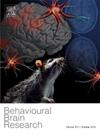迭代囚徒困境中合作与公平的神经机制
IF 2.6
3区 心理学
Q2 BEHAVIORAL SCIENCES
引用次数: 0
摘要
合作是人类的普遍原则,反映了与他人合作以实现共同目标。理性决策模型认为,在迭代的囚徒困境中,合作是实现利益最大化的最佳策略。然而,合作(或背叛)的动机复杂多样,通常还包括公平性的考虑。在这项研究中,我们利用功能磁共振成像技术研究了当人们在不同决策阶段与容易合作或背叛的对手互动时,与公平性相关的脑区的潜在神经差异。基于 40 名大学生(25 名女性)的研究结果表明,合作或背叛的经历会影响人们的公平感知。在决策的预期、决策和结果阶段会出现不同的神经活动。在期望阶段,与不合作者相比,合作者扣带回前部、额叶内侧上回和尾状核的激活增加。在决策阶段,与不合作者相比,合作者额叶中回、尾状核/额叶岛叶、额叶下回和扣带回的激活程度更高。在结果反馈阶段,不合作状态下的尾状核、脑岛、扣带回和眼眶额下回比合作状态下更活跃。结果还显示,在预测不合作条件时,尾状核活动与公平感之间存在明显的相关性。本文章由计算机程序翻译,如有差异,请以英文原文为准。
Neural mechanisms of cooperation and fairness in iterative prisoner’s dilemma
Cooperation is a universal human principle reflecting working with others to achieve common goals. The rational decision-making model contends that cooperation is the best strategy for maximizing benefits in an iterative prisoner’s dilemma. However, the motivations for cooperation (or betrayal) are complex and diverse, and often include fairness reflections. In this study, we used functional magnetic resonance imaging to study underlying neural differences in brain regions related to fairness when people interact with an opponent who tend to cooperate or betray, at different decision-making stages. Results based on 40 university students (25 women) indicate that experiences of cooperation or betrayal affect people’s fairness perception. Distinct neural activities occur in expectation, decision, and outcome phases of decisions. In the expectation phase, those in the cooperative condition exhibited increased activation in the anterior cingulate gyrus, medial superior frontal gyrus, and caudate nucleus compared to those in the uncooperative condition. During the decision phase, those in the cooperative condition showed greater activation in the middle frontal gyrus, caudate nucleus/frontal insula, inferior frontal gyrus, and cingulate gyrus compared to those in the uncooperative condition. In the outcome feedback phase, the caudate nucleus, insula, cingulate gyrus, and inferior frontal gyrus of the orbit were more active in the uncooperative condition than in the cooperative condition. Results also showed a significant correlation between caudate activity and the perception of fairness when expecting uncooperative conditions.
求助全文
通过发布文献求助,成功后即可免费获取论文全文。
去求助
来源期刊

Behavioural Brain Research
医学-行为科学
CiteScore
5.60
自引率
0.00%
发文量
383
审稿时长
61 days
期刊介绍:
Behavioural Brain Research is an international, interdisciplinary journal dedicated to the publication of articles in the field of behavioural neuroscience, broadly defined. Contributions from the entire range of disciplines that comprise the neurosciences, behavioural sciences or cognitive sciences are appropriate, as long as the goal is to delineate the neural mechanisms underlying behaviour. Thus, studies may range from neurophysiological, neuroanatomical, neurochemical or neuropharmacological analysis of brain-behaviour relations, including the use of molecular genetic or behavioural genetic approaches, to studies that involve the use of brain imaging techniques, to neuroethological studies. Reports of original research, of major methodological advances, or of novel conceptual approaches are all encouraged. The journal will also consider critical reviews on selected topics.
 求助内容:
求助内容: 应助结果提醒方式:
应助结果提醒方式:


